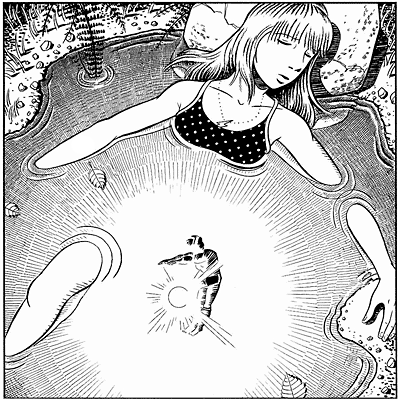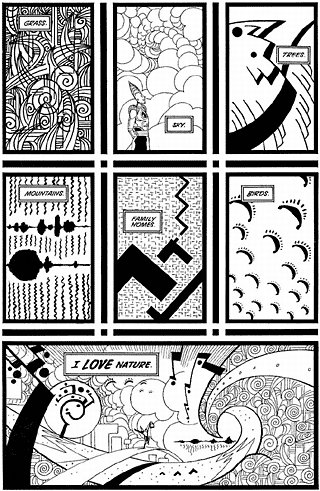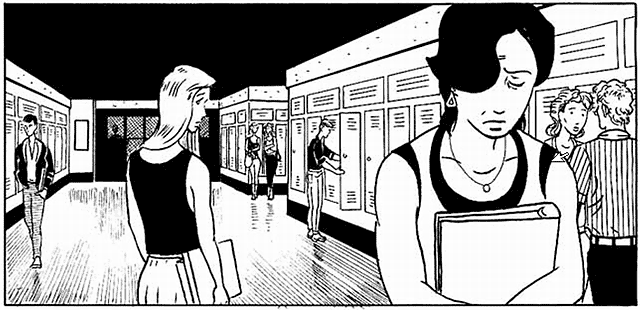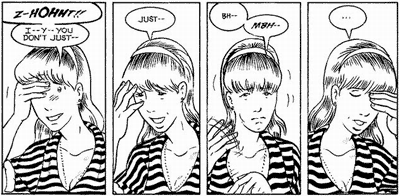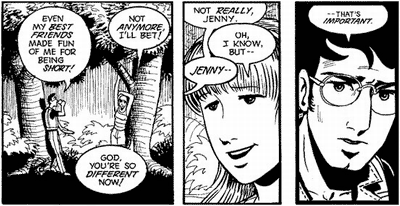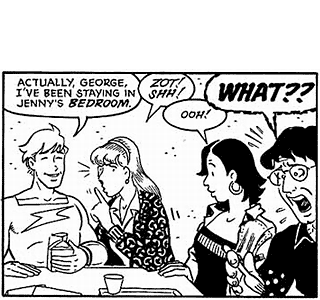
Scott McCloud, 1984-1991 One of the items on my livejournal list of interests is "redemption of the ludicrous." I love the idea of taking something silly and building a quality work of art around it. Ed Wood does this, taking some of the worst films ever made and somehow making them seriously moving by showing the wider context of what they meant to the people involved in them. My favorite book, Watchmen, does this by taking characters from a second-tier comic book company of the 1960s and weaving a profound and narratologically groundbreaking story around them. In fact, a lot of comics do this. They take children's stories from half a century ago and use them as the foundation for what can only be called literature. Zot! is a microcosm of this sort of thing. Its first ten issues were a brightly-colored adventure story that might as well have been a Saturday morning cartoon — a well-done Saturday morning cartoon, a Saturday morning cartoon with a few serious points slipped in to get the gears turning in sugar-addled young minds, but a Saturday morning cartoon nonetheless.
But after an absence of a year and a half, Zot! came back. And it was different. Economics had dictated a shift to black and white, but writer/artist Scott McCloud seemed to find the change inspiring. McCloud has never been a vibrant artist. He's not gifted with the sort of felicitous line that allows some artists to just go scribble scribble and turn out something that looks alive. But his art in the black-and-white run of Zot! is beautiful. Beautiful the way blueprints are beautiful. The style is so clean that it doesn't even feel like a style — it feels like McCloud is channeling the fundamental language of comics, even though that is as impossible as speaking without an accent.
But while it was more cerebral and experimental than Marvel and DC superhero books, Zot! had also come to resemble them much more than the Astro Boy-style children's adventure that had originally inspired it. So with the last nine issues, McCloud did something that moved the series beyond being just an excellent 1980s superhero comic and into The Canon: he got rid of Zot's world. At the end of #27, Zot is stranded on Earth with no way to get back to the setting of the color issues. No more supervillains. No more flying cars, no more robot butlers, no more zap guns. Instead, we got this:
Zot! became a comic examining the difficult lives of a group of geeky kids at a New England high school. Each issue spotlights a different person and explores how the medium of comics can be used to create poignant real-world character studies. The only twist is Zot himself, the naive stranger in a strange land who sometimes lets the other kids see things from an outside perspective. In earlier issues of Zot! you had de-evolutionary rays foiling AI assassins in outer space and it elicited maybe a smirk. But in the Earth Stories, Zot flies around an empty gym and the miracle this represents makes it hard not to break into a sobbing fit.
Well, it's the redemption of the ludicrous! Zot! would not have worked nearly as well had #28 been #1. What made Zot! work so well was that we weren't just told that Zot was a good-hearted, boundlessly optimistic and decent hero — we'd seen it, for 27 issues. We knew the zany world Zot had come from because it had been the setting for most of the series. What made the Earth Stories so moving was not just their literary quality, but the fact that they were appearing in Zot! — look how far the series had come! It's just like the way "A Day in the Life" becomes even more powerful when you reflect on the fact that this is the same group that a few years earlier could only manage "Love Me Do."
Return to the Calendar page!
|

